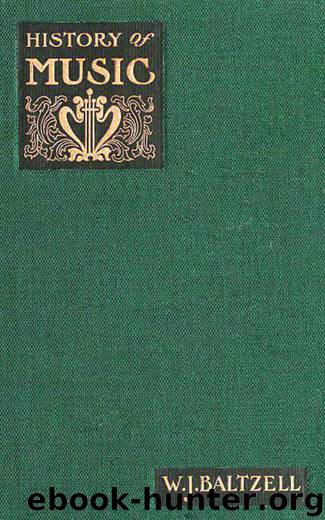A Complete History of Music by W. J. Baltzell

Author:W. J. Baltzell [Baltzell, W. J. (Winton James)]
Language: eng
Format: epub
Publisher: anboco
Published: 2017-03-19T23:00:00+00:00
LESSON XXXI.
Wolfgang Amadeus Mozart.
While Haydn’s genius was shining steadily as a fixed star, Mozart flashed across the musical heaven, meteorlike, throwing a flood of light over the music world. The knowledge which others spent years in acquiring seemed his by birthright; and thus, although the years of his life were few, the period of his artistic activity was proportionately long.
Mozart’s Early Musical Training.—Wolfgang Amadeus Mozart was born at Salzburg, January 27, 1756. His father, himself of some reputation as a composer and as the author of the first German violin method, was quick to perceive the child’s sensitiveness toward music; and began instruction in clavier playing when Wolfgang was but four years old, teaching also his daughter, Maria Anna, five years older. Wolfgang was an exceedingly delicate and receptive child; and at the age of six he had not only acquired remarkable proficiency on the instrument, but had composed a number of little pieces, and a clavier sonata.
First Concert Tours.—Realizing the remarkable talent of his children, Mozart, the father, in 1762, ventured on a concert trip with them to Munich, and later to Vienna, where their playing became the sensation of the hour, and where they were received by the Emperor, Franz Josef I, at his palace. Having been presented with a small violin, Mozart acquired facility in its technic with extraordinary quickness, as also was the case when he attempted the use of organ pedals. The brilliant French court was then the Mecca of artists; and in 1763, the children were taken to Paris, where their suc cesses were redoubled, and where they gave two brilliant concerts, after having played before the royal family at Versailles. At Paris, moreover, the opus 1 and opus 2 of the little Mozart were published, each comprising two sonatas for harpsichord, with accompaniment of violin or flute.
England.—Proceeding now to England, the children won fresh laurels, remaining there fifteen months; during which time Wolfgang excited the admiration of the king, George III, by his sight-reading of works by Handel, Bach and others. He also wrote other sonatas, and his first symphonies. Returning to Salzburg, after a three years’ absence, Mozart applied himself to serious study, composing his first oratorio and opera, which latter was not performed in public, and also appearing as conductor at a concert in which his “Solemn Mass” was performed.
Honors in Italy.—Renewed triumphs awaited him in Italy, where his father took him in 1769, and where his genius was immediately recognized in the leading cities. At Rome he was honored by the Order of the Golden Spur, conferred by the Pope; and in Bologna was admitted to membership in the exclusive Philharmonic Academy, passing with ease an examination which would have appalled many mature musicians; in Milan his opera “Mitridate” was received enthusiastically, and given twenty consecutive performances, under his own direction.
Journey to Paris.—Returning to Salzburg, Mozart took up the post previously given him of music director to the Archbishop; but his emolument, at first wholly wanting, was insignificant, and the Archbishop, having little appreciation of his abilities, proved a thankless taskmaster.
Download
This site does not store any files on its server. We only index and link to content provided by other sites. Please contact the content providers to delete copyright contents if any and email us, we'll remove relevant links or contents immediately.
The Goal (Off-Campus #4) by Elle Kennedy(13640)
Kathy Andrews Collection by Kathy Andrews(11795)
Diary of a Player by Brad Paisley(7539)
What Does This Button Do? by Bruce Dickinson(6187)
Assassin’s Fate by Robin Hobb(6184)
Big Little Lies by Liane Moriarty(5773)
Altered Sensations by David Pantalony(5086)
Pale Blue Dot by Carl Sagan(4984)
Sticky Fingers by Joe Hagan(4172)
The Death of the Heart by Elizabeth Bowen(3596)
The Heroin Diaries by Nikki Sixx(3534)
Beneath These Shadows by Meghan March(3290)
Confessions of a Video Vixen by Karrine Steffans(3290)
How Music Works by David Byrne(3246)
The Help by Kathryn Stockett(3130)
Jam by Jam (epub)(3068)
Harry Potter 4 - Harry Potter and The Goblet of Fire by J.K.Rowling(3046)
Computational Linguistics and Intelligent Text Processing: 20th International Conference, CICLing 2019 La Rochelle, France, April 7â13, 2019 Revised Selected Papers, Part I by Alexander Gelbukh(2975)
Strange Fascination: David Bowie: The Definitive Story by David Buckley(2848)
